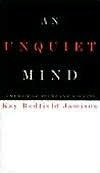More on this book
Community
Kindle Notes & Highlights
In short, for myself, I am a hard act to follow. And I miss Saturn very much.
I simply did not want to believe that I needed to take medication. I had become addicted to my high moods; I had become dependent upon their intensity, euphoria, assuredness, and their infectious ability to induce high moods and enthusiasms in other people.
Like gamblers who sacrifice everything for the fleeting but ecstatic moments of winning, or cocaine addicts who risk their families, careers, and lives for brief interludes of high energy and mood, I found my milder manic states powerfully inebriating and very conducive to productivity.
Somehow I was convinced that I was an exception to the extensive research literature, which clearly showed not only that manic-depressive illness comes back, but that it often comes back in a more severe and frequent form.
But manic-depressive illness occurs equally often in women and men, and, being a relatively common condition, mania ends up affecting a large number of women. They, in turn, often are misdiagnosed, receive poor, if any, psychiatric treatment, and are at high risk for suicide, alcoholism, drug abuse, and violence.
No matter what struggles I had had with lithium, it was painfully clear to me that without it I would have been long dead or on the back wards of a state hospital. I was one of many who owed their lives to the black circles and squares in Schou’s family tree.
Untreated mood disorders result in risks not only to patients, but to the doctors themselves. Far too many doctors—many of them excellent physicians—commit suicide each year; one recent study concluded that, until quite recently, the United States lost annually the equivalent of a medium-sized medical school class from suicide alone. Most physician suicides are due to depression or manic-depressive illness, both of which are eminently treatable. Physicians, unfortunately, not only suffer from a higher rate of mood disorders than the general population, they also have a greater access to very
...more
“If we got rid of all of the manic-depressives on the medical school faculty, not only would we have a much smaller faculty, it would also be a far more boring one.”
But, normal or manic, I have run faster, thought faster, and loved faster than most I know. And I think much of this is related to my illness—the intensity it gives to things and the perspective it forces on me.


